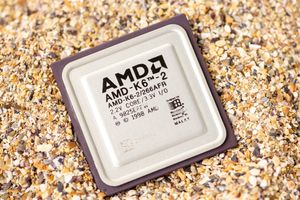
The fusion of quantum computing and artificial intelligence is set to redefine the very foundations of AI semiconductor design, ushering in an era of unprecedented computational power and efficiency. This groundbreaking synergy promises to transcend the limitations of classical computing, enabling AI systems to tackle problems of unparalleled complexity and scale. As the demand for more powerful and energy-efficient AI hardware intensifies, quantum principles are emerging as the key to unlocking future chip architectures and processing paradigms that were once considered theoretical.
This development marks a pivotal moment in the evolution of AI, signaling a shift from incremental improvements to a fundamental transformation in how intelligent systems are built and operate. By leveraging the bizarre yet powerful laws of quantum mechanics, researchers and engineers are laying the groundwork for AI chips that can process information in ways unimaginable with current technology, potentially leading to breakthroughs across every sector reliant on advanced computation.
The Quantum Leap: Reshaping Chip Architectures with Superposition and Entanglement
At the heart of this revolution are the fundamental principles of quantum mechanics: superposition and entanglement. Unlike classical bits, which exist in a definite state of either 0 or 1, quantum bits (qubits) can exist in multiple states simultaneously, a phenomenon known as superposition. This allows quantum computers to explore a vast number of potential solutions concurrently, offering a form of parallelism that classical systems cannot replicate. For AI, this means exploring immense solution spaces in parallel, dramatically accelerating complex problem-solving.
Entanglement, the other cornerstone, describes a profound connection where two or more qubits become intrinsically linked, their states instantaneously influencing each other regardless of physical separation. This strong correlation is a critical resource for quantum computation, enabling powerful algorithms that go beyond classical capabilities. In quantum machine learning, entanglement can eliminate the exponential overhead in data size often required to train quantum neural networks, leading to greater scalability and enhancing pattern recognition and feature extraction through more complex data representations.
These quantum principles are poised to supercharge AI in several ways. The inherent parallelism of superposition and entanglement leads to significant speedups in AI algorithms, especially for tasks involving large datasets or complex optimization problems that are ubiquitous in deep learning and neural network training. Quantum algorithms like the Quantum Approximate Optimization Algorithm (QAOA) and Variational Quantum Eigensolver (VQE) can enhance optimization tasks, leading to faster and more efficient learning processes. Furthermore, quantum computers excel at handling and processing vast amounts of data due to their compact data representation capabilities, benefiting applications such as natural language processing, image recognition, and recommendation systems. Quantum neural networks (QNNs), which integrate quantum principles into neural network architectures, offer novel ways to model and represent complex data, potentially leading to more robust and expressive AI models.
The impact on AI semiconductor design will manifest in the form of future AI processing and chip architectures. Quantum co-processors or full quantum AI chips could accelerate computationally intensive AI tasks, such as training deep learning models that currently take weeks and consume enormous power. This could also lead to more energy-efficient AI algorithms. The immediate future likely involves hybrid classical-quantum architectures, where specialized quantum processors work in concert with existing classical semiconductor technologies. This approach allows quantum enhancements to be practically and scalably implemented, addressing current hardware limitations. Future semiconductor designs will need to incorporate various qubit implementations—superconducting circuits, trapped ions, or photonic structures—and integrate advanced error correction techniques to combat qubit fragility and maintain coherence. Quantum computing can also accelerate the development of advanced architectures like 3D chips and neuromorphic processors, vital for cutting-edge AI, and optimize fabrication processes at the quantum level to reduce errors and improve efficiency, offering exponential performance improvements over classical methods which are approaching physical limits.
Corporate Race for Quantum AI Dominance: Tech Giants and Startups Converge
The race to harness quantum AI is attracting significant investment and strategic maneuvering from tech giants, established AI companies, and innovative startups, all vying for a leading position in this transformative field. The competitive landscape is intense, with companies focusing on both hardware development and the creation of robust software ecosystems.
Google Quantum AI (NASDAQ: GOOGL) is heavily invested in superconducting qubit processors, with initiatives like the Sycamore and Willow chips aiming for enhanced computational power and scalable error correction. Google is also a proponent of quantum error correction and hybrid classical-quantum models for machine learning, fostering its ecosystem through open-source frameworks like Cirq and TensorFlow Quantum. The company expanded its hardware capabilities by acquiring Atlantic Quantum in 2025, specializing in integrated quantum computing hardware. Similarly, IBM (NYSE: IBM) is building a comprehensive quantum and AI ecosystem, marked by a $500 million investment in quantum and AI startups. IBM operates the world's largest fleet of quantum systems and leads the IBM Quantum Network, aiming to demonstrate "quantum advantage" by 2026 and deliver a fault-tolerant quantum computer by 2029. Its open-source Qiskit software is central to its strategy.
Microsoft (NASDAQ: MSFT) is pursuing fault-tolerant quantum systems based on topological qubits, exemplified by its Majorana 1 chip. Azure Quantum, its cloud-based platform, provides software tools and access to third-party quantum hardware, with partnerships including Atom Computing and Quantinuum. Microsoft is also integrating AI, high-performance computing (HPC), and quantum hardware, committing $30 billion to AI and quantum workloads. Amazon (NASDAQ: AMZN) offers Amazon Braket, a fully managed quantum computing service providing on-demand access to various quantum hardware technologies from providers like IonQ (NYSE: IONQ) and Rigetti Computing (NASDAQ: RGTI). AWS is also developing its proprietary "Ocelot" chip, using "cat qubits" to reduce the cost of quantum error correction.
Intel (NASDAQ: INTC) is leveraging its advanced CMOS manufacturing processes to develop silicon-based quantum processors, focusing on silicon spin qubits for their potential density and on cryogenic control electronics. Its "Tunnel Falls" chip is available to researchers, and Intel aims for production-level quantum computing within ten years. NVIDIA (NASDAQ: NVVDIA) positions itself as a core enabler of hybrid quantum-classical computing, providing GPUs, software (CUDA-Q, cuQuantum SDK), and reference architectures to design, simulate, and orchestrate quantum workloads. NVIDIA's Accelerated Quantum Research Center (NVAQC) integrates leading quantum hardware with its AI supercomputers to advance quantum computing and AI-driven error correction.
Beyond these giants, a vibrant ecosystem of startups is emerging. IonQ (NYSE: IONQ) specializes in trapped-ion quantum technology, offering higher coherence times and lower error rates through its Quantum-as-a-Service (QaaS) model. Rigetti Computing (NASDAQ: RGTI) develops superconducting qubit-based quantum processors and provides hardware and software through its Quantum Cloud Services (QCS) platform. Quantinuum, formed by the merger of Honeywell Quantum Solutions and Cambridge Quantum Computing, is a key player in both hardware and software. Other notable players include SandboxAQ, a Google spin-off integrating AI and quantum for cybersecurity and optimization, and Multiverse Computing, which specializes in quantum-inspired algorithms to compress AI models. These companies are not only developing quantum hardware but also crafting quantum-enhanced AI models that can outperform classical AI in complex modeling tasks for semiconductor fabrication, potentially leading to shorter R&D cycles, reduced manufacturing costs, and the ability to push beyond the limits of classical computing.
A Paradigm Shift: Wider Significance and Ethical Imperatives
The integration of quantum computing into AI semiconductor design represents more than just a technological upgrade; it's a paradigm shift that will profoundly reshape the broader AI landscape and introduce critical societal and ethical considerations. This development is seen as a foundational technology addressing critical bottlenecks and enabling future advancements, particularly as classical hardware approaches its physical limits.
The insatiable demand for greater computational power and energy efficiency for deep learning and large language models is pushing classical hardware to its breaking point. Quantum-semiconductor integration offers a vital pathway to overcome these bottlenecks, providing exponential speed-ups for certain tasks and allowing AI models to tackle problems of unparalleled complexity and scale. This aligns with the broader trend towards specialized hardware in the semiconductor industry, with quantum computing poised to turbocharge the AI revolution. Many experts view this as a crucial step towards Artificial General Intelligence (AGI), enabling AI models to solve problems currently intractable for classical systems. Furthermore, AI itself is being applied to accelerate quantum and semiconductor design, creating a virtuous cycle where quantum algorithms enhance AI models used in designing advanced semiconductor architectures, leading to faster and more energy-efficient classical AI chips. This development also addresses the growing concerns about the energy consumption of AI data centers, with quantum-based optimization frameworks promising significant reductions.
However, the immense power of quantum AI necessitates careful consideration of its ethical and societal implications. Quantum computers pose a significant threat to current encryption methods, potentially breaking sensitive data security. This drives an urgent need for the development and embedding of post-quantum cryptography (PQC) into semiconductors to safeguard AI operations. The inherent complexity of quantum systems may also exacerbate existing concerns about AI bias and explainability, making it more challenging to understand and regulate AI decision-making processes. There is a risk that quantum AI could widen the existing technological and digital divide due to unequal access to these powerful and expensive technologies. The "dual-use dilemma" also raises concerns about potential misuse in areas such as surveillance or autonomous weapons, necessitating robust regulatory frameworks and ethical guardrails to ensure responsible development and deployment.
Comparing this to previous AI milestones, quantum AI in semiconductor design is not merely an incremental upgrade but a fundamental shift, akin to the transition from CPUs to GPUs that fueled the deep learning revolution. While Moore's Law has guided semiconductor manufacturing for decades, quantum AI offers breakthroughs beyond these classical approaches, potentially revitalizing or evolving it into new paradigms. Demonstrations like Google's Sycamore processor achieving "quantum supremacy" in 2019, solving a complex problem faster than the world's most powerful supercomputers, highlight the transformative potential, much like the introduction of the graphical user interface revolutionized personal computing. This fusion is described as a "new era of computational prowess," promising to unlock unprecedented capabilities that redefine the boundaries of what machines can achieve.
The Horizon: Future Developments and Expert Predictions
The journey of quantum AI in semiconductor design is just beginning, with a roadmap filled with exciting near-term and long-term developments, alongside significant challenges that must be addressed. Experts predict a dramatic acceleration in the adoption of AI and machine learning in semiconductor manufacturing, with AI becoming the "backbone of innovation."
In the near term (1-5 years), we can expect continued advancements in hybrid quantum-classical architectures, where quantum co-processors enhance classical systems for specific, computationally intensive tasks. Improvements in qubit fidelity and coherence times, with semiconductor spin qubits already exceeding 99% fidelity for two-qubit gates, are crucial. The development of cryogenic control electronics, operating closer to the quantum chip, will reduce latency and energy loss, with companies like Intel actively pursuing integrated control chips. Advanced packaging technologies like 2.5D and 3D-IC stacking will also enhance existing silicon-based technologies. On the software front, quantum machine learning (QML) models are being validated for semiconductor fabrication, demonstrating superior performance over classical AI in modeling critical properties like Ohmic contact resistance. Quantum Software Development Kits (SDKs) like Qiskit, Cirq, and PennyLane will continue to evolve and integrate into existing data science workflows and Electronic Design Automation (EDA) suites. AI-assisted quantum error mitigation will also play a significant role in enhancing the reliability and scalability of quantum technologies.
Looking towards the long term (5-10+ years), the major goal is achieving fault-tolerant quantum computing, involving robust error correction mechanisms to enable reliable computation despite qubit fragility. This is critical for unlocking the full potential of quantum AI. Quantum simulation will enable the discovery and commercial fabrication of new transistor architectures and post-CMOS paradigms. Quantum AI will ironically contribute to the design of quantum devices themselves, including quantum dot manufacturing, cryogenic CMOS for control electronics, and 3D/advanced packaging for integrated quantum systems. IBM aims for 100,000 qubits by 2033, while Google targets a 1 million-qubit system. Software will see mainstream integration of quantum-accelerated AI into front-end design, back-end layout, and process control in semiconductor manufacturing. Truly quantum neural networks that can process information in fundamentally different ways will emerge, leading to novel forms of machine learning. AI, potentially enhanced by quantum capabilities, will drive the semiconductor industry towards autonomous operations, including self-calibrating quantum chips and sophisticated computational lithography.
Potential applications are vast, ranging from accelerated chip design and optimization, leading to rapid discovery of novel materials and reduced R&D cycles, to enhanced materials discovery and science through quantum simulation. Quantum-enhanced AI will expedite complex tasks like lithography simulation, advanced testing, and yield optimization. AI-driven defect detection will be crucial for advanced packaging and sensitive quantum computing chips. Furthermore, quantum cryptography will secure sensitive data, necessitating the rapid development of post-quantum cryptography (PQC) solutions integrated directly into chip hardware.
Despite this promising outlook, significant challenges remain. Current quantum computers suffer from noisy hardware, limited qubit counts, and short coherence times. Efficiently translating vast, high-dimensional design data into qubit states is complex. The development of new quantum algorithms has lagged, and there's a need for more algorithms that provide real-world advantages. The sheer volume and complexity of data in semiconductor manufacturing demand highly scalable AI solutions. Corporate buy-in and clear demonstrations of ROI are essential, as semiconductor R&D is expensive and risk-averse. Protecting valuable intellectual property in a quantum-enabled environment is a critical concern, as is the need for a skilled workforce.
Experts predict the quantum technology market, currently valued around $35 billion, could reach $1 trillion by 2030, reflecting significant financial interest. Global semiconductor revenues could surpass $1 trillion by 2030, with AI chips driving a disproportionate share. The synergy between quantum computing and AI is seen as a "mutually reinforcing power couple," expected to accelerate in 2025, impacting optimization, drug discovery, and climate modeling. Within the next decade, quantum computers are expected to solve problems currently impossible for classical machines, particularly in scientific discovery and complex optimization. This will lead to new workforce roles and potentially reshape global electronics supply chains.
A New Frontier: The Quantum AI Imperative
The convergence of quantum computing and AI in semiconductor design represents a new frontier, promising to redefine the very essence of computational intelligence. The key takeaways from this evolving landscape are clear: quantum principles offer unprecedented parallelism and data representation capabilities that can overcome the limitations of classical AI hardware. This will lead to radically new chip architectures, significantly accelerated AI model training, and the discovery of novel materials and optimization processes for semiconductor manufacturing.
The significance of this development in AI history cannot be overstated. It is not merely an incremental improvement but a fundamental shift, akin to previous pivotal moments that reshaped the technological landscape. While challenges related to hardware stability, error correction, algorithmic development, and workforce readiness are substantial, the potential for exponential performance gains, energy efficiency, and the ability to tackle previously intractable problems is driving massive investment and research from tech giants like Google (NASDAQ: GOOGL), IBM (NYSE: IBM), Microsoft (NASDAQ: MSFT), Amazon (NASDAQ: AMZN), Intel (NASDAQ: INTC), and Nvidia (NASDAQ: NVDA), alongside a vibrant ecosystem of innovative startups.
Looking ahead, the coming weeks and months will likely see continued breakthroughs in qubit stability, hybrid quantum-classical software development, and early demonstrations of quantum advantage in specific AI-related tasks. The focus will remain on building scalable, fault-tolerant quantum systems and developing practical quantum algorithms that can deliver tangible benefits to the semiconductor industry and, by extension, the entire AI ecosystem. The integration of quantum AI into semiconductor design is an imperative for advancing artificial intelligence, promising to unlock unprecedented levels of computational power and intelligence that will shape the future of technology and society.
This content is intended for informational purposes only and represents analysis of current AI developments.
TokenRing AI delivers enterprise-grade solutions for multi-agent AI workflow orchestration, AI-powered development tools, and seamless remote collaboration platforms.
For more information, visit https://www.tokenring.ai/.





